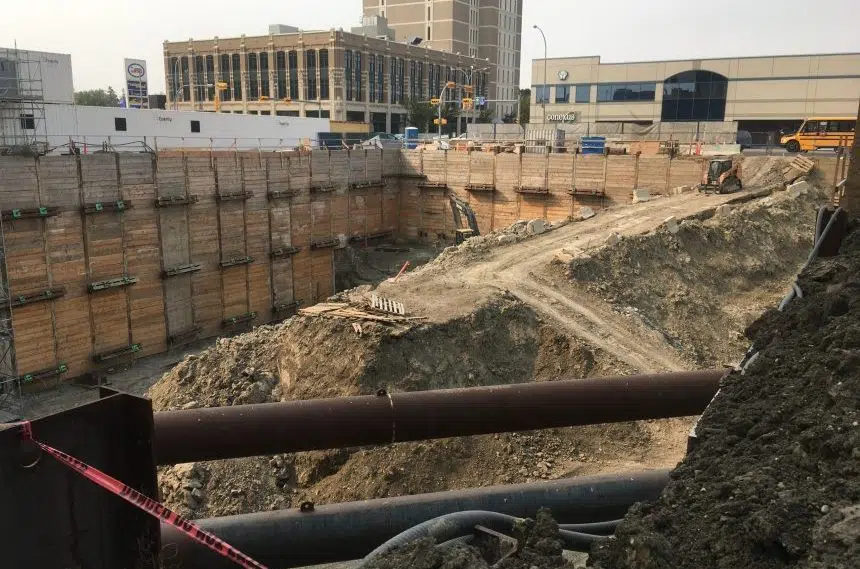The city got to present their case as to why the Capital Pointe hole should be backfilled during the second day of the appeal Wednesday.
Lawyers representing the city and Westgate Properties, the company which owns the Capital Pointe site, once again met in front of an appeal board Wednesday.
The city is arguing the hole is no longer safe and needs to be filled. The lawyers representing Westgate are arguing the site is safe and stable but if the Saskatchewan Building and Accessibility Standards Appeal Board rules against them, they are also seeking an alternative to filling the hole.
Day two began with the city continuing its cross-examination of Westgate’s expert Kai-sing Hui — a geotechnical engineer with EXP — who said the site is safe according to tests and monitoring they have done.
Currently, the only work being done at the site is the monitoring of the shores to ensure minimal movement is occurring.
While some cracks have appeared on the streets around the site, Hui said those cracks are not always caused by ground shifting and simple wear and tear on the roadways can lead to them appearing. Hui said from a geotechnical stand-point, there is no reason work can not recommence on the Capital Pointe site.
There have also been instances where water has been pooling within the excavation site. Christine Clifford, the City of Regina’s lawyer, said the National Building Code indicates pooling water must be dealt with but Hui argued it can be up to an engineer’s discretion if there is no one working on-site. He said pooling water does not often have an effect on the stability of the excavation.
Hui answered questions from the panel as well Wednesday morning, indicating EXP’s retainer on the site only lasts until December. After it is up and if they are not asked to continue, they would provide recommendations as to what work would need to be done on the site to ensure it remains stable.
He said the site is not being left unattended and engineers are checking in to ensure the stability of the site remains intact, with another test being done at the end of July. There is also automated monitoring equipment which can be installed to watch movements.
Hui said there are certain things that are out of a geotechnical engineers control which can happen, such as a waterline breaking and flooding the site. He said if something like that happened, there would be work done immediately to remedy the situation.
Once Hui was done answering questions, the city began its testimony as to why it believes the hole should be filled.
The city brought forward their expert — Dr. Rob Kenyon who is the manager of technical engineering for KGS Group. Kenyon has worked on projects that have dealt with similar soil conditions Capital Pointe is dealing with, including new Mosaic Stadium.
He said the last time a groundwater table measurement was taken at the Capital Pointe site was in 2010.
While working on Mosaic Stadium, he said they had found the groundwater table had changed back in 2014.
According to Global Regina, Kenyon said the dry cleaners located next to the site had seen some ground movement — possibly having moved nine millimetres towards the site and near 20 millimetres of shifting at the footing of the building. This sort of movement can lead to cracks.
Global Regina also reports the main arguments made by the city are that Isherwood did not correctly estimate the force that will be applied to the shoring and that there are unknowns about the groundwater levels.
Westgate’s lawyers were able to question these concerns which were brought up by Kenyon.
The appeal hearing is expected to wrap up Thursday with a written decision coming at a later date.
— With files from Global Regina’s Colton Praill











